1. Early Life and Career Beginnings
Mike Quackenbush's journey into professional wrestling began with an untrained start, driven by his early admiration for Japanese wrestling. He eventually sought formal training and quickly made a name for himself on the independent circuit.
1.1. Early Professional Wrestling Career
Born Michael Spillane on March 18, 1976, he began his professional wrestling career by accepting bookings from various local independent companies, including PCW and SCW, in late 1998. Early in his life, Quackenbush developed a strong admiration for Japanese professional wrestler Jushin Thunder Liger, adopting the nickname "Lightning" as a tribute. Despite entering the professional wrestling business without formal training, he received instruction from wrestler Ace Darling, who took Quackenbush under his wing as a protégé. By 1999, his talent was recognized, leading to his ranking at #128 in the annual PWI 500 and being named the June Flavour of the Month by the publication.
Quackenbush eventually befriended independent wrestlers Reckless Youth and Don Montoya. The trio began teaming together as a unit known as The Black T-Shirt Squad (abbreviated to The BTS). This name originated from their distinctive black t-shirt attire, suggested by fellow wrestlers, and was subsequently adopted as their official ring name. Quackenbush increasingly focused on bookings alongside his stablemates rather than performing as a singles wrestler during this period.
2. Chikara and The Wrestle Factory
The Chikara promotion and its affiliated training school, The Wrestle Factory, were pivotal to Mike Quackenbush's career, serving as a platform for his innovative approach to professional wrestling and his transition into a significant leadership role.
2.1. Founding and Early Development
In January 2002, Mike Quackenbush co-founded a professional wrestling school, branded The Wrestle Factory, alongside Reckless Youth. Both individuals were appointed as head trainers for the school. Building on this foundation, they officially launched the professional wrestling promotion Chikara in May of the same year.
Chikara's inaugural show took place on May 25, 2002, where Quackenbush teamed with his fellow Black T-Shirt Squad stablemates, Reckless Youth and Don Montoya. In their debut match, they secured a victory over the Gold Bond Mafia, a team consisting of CM Punk, Colt Cabana, and Chris Hero. Quackenbush concluded his first feud within Chikara at the final show of 2002, successfully pinning Mitch Ryder. The following year, Quackenbush formed the "SuperFriends" tag team with Chris Hero, achieving an undefeated record throughout the entire year.
In 2004, Quackenbush aligned himself with Team F.I.S.T. (Icarus and Gran Akuma) and initiated a feud with the Toxic Trio (Eddie Kingston, BlackJack Marciano, and Jigsaw). Their rivalry culminated in a match on May 22, 2004, at Aniversario 3: Dodging the Sophomore Jinx. Quackenbush and Team F.I.S.T. emerged victorious, and as per the match stipulation, Kingston and Marciano had their heads shaved. In the spring of 2004, Quackenbush temporarily disappeared from Chikara shows, coinciding with the rise of Larry Sweeney's Sweet 'n' Sour International stable. He made a return on October 30 during the first annual torneo cibernetico match at The Cibernetico Cometh. Under a mask and the ring name Spyrazul, he appeared as a member of Sweet 'n' Sour International. However, by the match's conclusion, Spyrazul surprisingly attacked his own teammates, unmasked himself, and abandoned Sweeney, who was then pinned by Jigsaw, ending the match.
In March 2005, The Chikara Wrestle Factory took over control of the Combat Zone Wrestling wrestling school. Quackenbush served as the head trainer for this joint facility for two years until the schools separated in March 2007. During this period, Quackenbush re-formed his "SuperFriends" tag team with Chris Hero, and they entered the 2005 Tag World Grand Prix. They reached the tournament finals, where they were defeated by "AC/CC" (Arik Cannon and Claudio Castagnoli) after Hero turned on Quackenbush. Subsequently, Hero, Castagnoli, and Cannon formed the successful stable The Kings of Wrestling, with whom Quackenbush, Reckless Youth, and Jigsaw engaged in a feud for the remainder of the year.
2.2. Key Storylines and Championship Reigns
In late 2005, Mike Quackenbush suffered a severe back injury that was considered career-threatening. He made his in-ring return on March 18, 2006, at a Westside Xtreme Wrestling event, where he defeated Ares to capture the wXw World Heavyweight Championship. Upon his return to Chikara on March 31, he subsequently dropped the title back to Ares. He then recruited Jigsaw and Shane Storm to assist him in his ongoing battle against the Kings of Wrestling, who had replaced Arik Cannon with Quackenbush's former partners from Team F.I.S.T. Quackenbush focused his efforts on Chris Hero, defeating Gran Akuma and Icarus using his newly developed finishing maneuver, the "Quackendriver III." By the end of the year, Quackenbush, Storm, and Jigsaw intervened to save Claudio Castagnoli from an attack by his Kings of Wrestling partners.
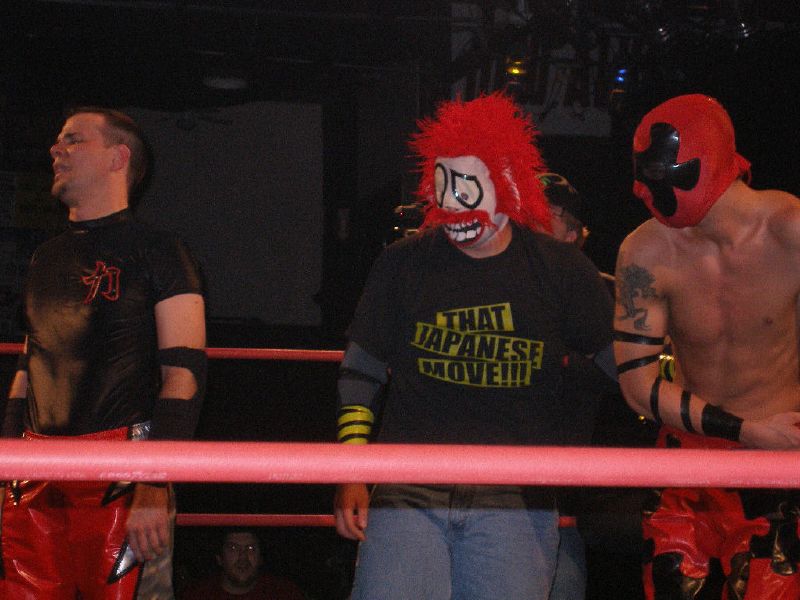
The year 2007 began successfully for Quackenbush, Jigsaw, and Storm, as they emerged victorious in the inaugural King of Trios tournament. Their path to victory involved defeating Team Canada (Jagged, Shane Matthews and Max Boyer), Team TNA (Alex Shelley, Chris Sabin and Sonjay Dutt), Team Mucha Lucha (Lince Dorado, El Pantera and Sicodelico, Jr.), and finally, a team consisting of Miyawaki, Yoshiaki Yago, and Kudo in the finals. The following month, on March 25, Claudio Castagnoli defeated Quackenbush in a match that determined who would represent Chikara in the first ever King of Europe Cup. In April 2007, Quackenbush refereed a match between former partners Chris Hero and Claudio Castagnoli, counting the pinfall that forced Castagnoli to rejoin the Kings of Wrestling. The subsequent month, Quackenbush faced Hero in a highly anticipated match, two years in the making, and defeated him after debuting a new submission maneuver, the "Chikara Special."
Following this victory, Quackenbush announced his intention to teach the "Chikara Special" and its counter to every tecnico wrestler on the Chikara roster, believing Hero would never be able to break the hold. However, to Quackenbush's surprise, Hero quickly broke the hold and even applied it himself in a match against Equinox. To uncover who leaked the move, Quackenbush sent Tim Donst to infiltrate the rudo stable, the Order of the Neo-Solar Temple, led by UltraMantis Black. Meanwhile, Quackenbush and Shane Storm achieved three consecutive victories, earning them the right to challenge for the Campeonatos de Parejas (Tag Team Championship). However, on June 14, 2008, Donst returned from his assignment and revealed to Quackenbush that his partner, Shane Storm, was the one who leaked the move to UltraMantis Black, who then taught it to Hero. Quackenbush subsequently attacked Storm, who found new partners in Vin Gerard and Colin Delaney and adopted the new ring name, Stigma.
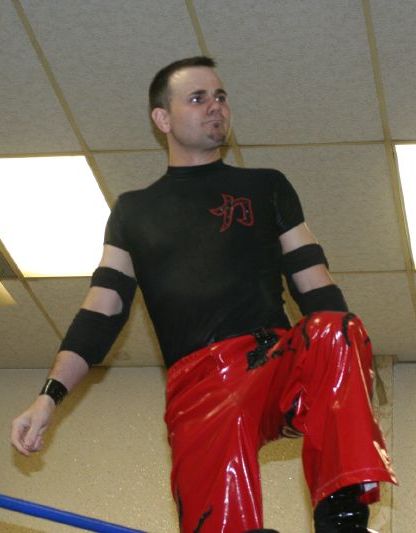
On September 7, 2008, Jigsaw, who had unmasked himself while competing in Ring of Honor, returned to Chikara and came to the aid of Quackenbush and Donst against the UnStable. Quackenbush reciprocated the favor the following month but refused to re-form their team until Jigsaw put his mask back on. On December 14, at the season seven finale, Quackenbush and a masked Jigsaw defeated Stigma and Delaney in a tag team match. In early 2009, Quackenbush and Jigsaw earned three points towards a title shot but were unsuccessful in their attempt to defeat the Campeones de Parejas, The Osirian Portal (Amasis and Ophidian), on April 25. Following the May anniversary shows, Quackenbush decided to take a hiatus from in-ring competition to recover from a back injury.
In 2010, Quackenbush became deeply involved in a feud with Bruderschaft des Kreuzes (BDK), a stable that had formed at the end of 2009 and posed a significant threat to Chikara. BDK members rapidly secured the Young Lions Cup, Campeonatos de Parejas, and King of Trios titles, and even had one of their members serving as Chikara's Director of Fun. After UltraMantis Black declared that rudos and tecnicos needed to unite to stop BDK, Quackenbush announced on August 11 that he would join a seven-man team to face BDK in the annual torneo cibernetico match on October 23.
Quackenbush and Jigsaw, after defeating The Young Bucks (Matt and Nick Jackson) and BDK members Lince Dorado and Pinkie Sanchez, aimed for a shot at BDK's Claudio Castagnoli and Ares and their Campeonatos de Parejas. However, on August 27, Quackenbush and Jigsaw failed to secure their third point, losing to BDK members Daizee Haze and Sara Del Rey due to questionable officiating from the stable's referee, Derek Sabato. The following day, Quackenbush and Jigsaw restarted their quest for three points, defeating the House of Truth (Josh Raymond and Christian Abel). On September 18, they earned their second point by defeating BDK's Lince Dorado and Tim Donst. On October 23, Quackenbush represented Chikara in the torneo cibernetico match against BDK. He eliminated Tim Donst by countering his "Inverted Chikara Special" into the original "Chikara Special," but was immediately eliminated himself by BDK's Claudio Castagnoli. The next day, Quackenbush and Jigsaw again failed to get their third point in a match against BDK members Pinkie Sanchez and Tursas.
This series of failures led to Stigma, Quackenbush's former partner, reminding them that he and Quackenbush still had the three points they had earned two and a half years earlier. However, Quackenbush made it clear that he intended to win the Campeonatos de Parejas with Jigsaw, not Stigma. On November 22, Quackenbush and Jigsaw competed in a four-way elimination match against Sara Del Rey and Daizee Haze, The Osirian Portal, and F.I.S.T. (Icarus and Chuck Taylor). After eliminating all three teams, they finally earned the three points necessary to challenge for the Campeonatos de Parejas. On December 12, 2010, at the season nine finale, Reality is Relative, Quackenbush and Jigsaw successfully cashed in their points, defeating Ares and Castagnoli two falls to one to win the Campeonatos de Parejas for the first time.
Quackenbush and Jigsaw successfully defended their title for the first time on February 19, 2011, against The Batiri (Obariyon and Kodama). For the 201ios tournament, Quackenbush and Jigsaw formed a trio with Japanese joshi legend Manami Toyota, who had debuted in Chikara alongside Quackenbush the previous September. On April 15, they defeated Amazing Red, Joel Maximo, and Wil Maximo in their first-round match. The following day, their trio was eliminated in the quarterfinal stage by Team Michinoku Pro (Dick Togo, Great Sasuke, and Jinsei Shinzaki). On September 18, Quackenbush and Jigsaw lost the Campeonatos de Parejas to F.I.S.T. (Chuck Taylor and Johnny Gargano) in their third title defense.
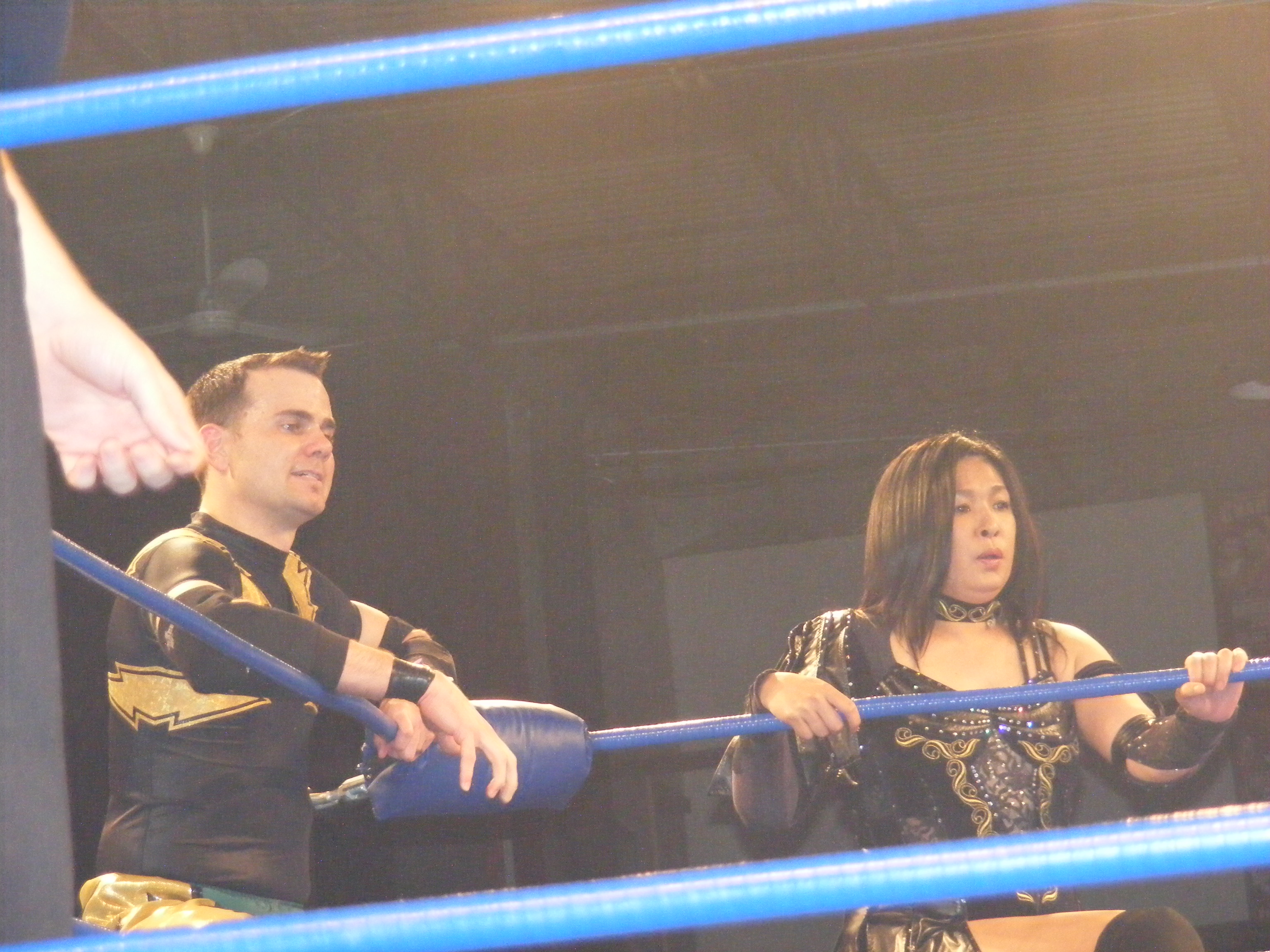
From May to October 2011, Quackenbush participated in 12 Large: Summit, a tournament designed to determine the first ever Chikara Grand Champion. Quackenbush ultimately won his block of the tournament with a record of four wins and one loss, setting up a final match against the winner of the other block, Eddie Kingston. On November 13, at Chikara's first internet pay-per-view, High Noon, Quackenbush was defeated by Kingston in the match to crown the inaugural Chikara Grand Champion.
Beginning on February 26, 2012, Quackenbush initiated a feud with the new Gekido stable, which included 17, assailAnt, combatAnt, deviAnt, and The Shard. assailAnt, combatAnt, and deviAnt later revealed themselves as former dropouts from the Chikara Wrestle Factory, while The Shard was a former training partner of Jigsaw. 17 claimed to have modeled his career after Quackenbush's and asserted that he was equally talented but had never received recognition. The group announced its intention to expose Chikara's "dark underbelly." On June 2, at Chikara's second internet pay-per-view, Chikarasaurus Rex: How to Hatch a Dinosaur, Quackenbush, Eddie Kingston, Jigsaw, Green Ant, and Soldier Ant defeated Gekido in a ten-man tag team match. After the match, Quackenbush controversially grabbed 17's hand and broke his fingers, sidelining him for nine weeks.
On August 18, Quackenbush and 17 faced off in a tag team match where Quackenbush and Jigsaw competed against 17 and The Shard. Quackenbush lost the match by disqualification for "excessive punishment" after delivering all four versions of his "Quackendriver" to 17, effectively ending 17's Chikara career. Following the match, Jigsaw confronted Quackenbush about his increasingly aggressive behavior. Quackenbush later explained that he no longer needed to control his temper or adhere to rules to maintain an image, as Eddie Kingston had taken over his role as the face of Chikara at High Noon.
On September 14, Quackenbush entered the 2012 King of Trios tournament, once again teaming with Jigsaw and Manami Toyota, as he had the previous year. In their first-round match, the trio defeated Gekido members combatAnt and deviAnt, and Colony member Soldier Ant. After the match, Quackenbush continued his aggressive streak by attacking combatAnt, also eliminating him from Chikara. The following day, Quackenbush, Jigsaw, and Toyota were eliminated from the tournament, losing to Team Sendai Girls (Dash Chisako, Meiko Satomura, and Sendai Sachiko). On November 18, Quackenbush aimed to eliminate The Shard from Chikara; however, his attempt was thwarted by Jigsaw, who delivered a superkick to his former Campeones de Parejas partner and then left the arena with The Shard. On December 2, at Chikara's third iPPV, Under the Hood, Quackenbush represented Chikara in an eight-man tag team match, where his team was defeated by Gekido, led by Jigsaw. Afterward, Quackenbush made peace with assailAnt, who turned tecnico and joined Chikara from Gekido.
On April 6, 2013, Quackenbush teamed with his idol Jushin Thunder Liger to defeat Jigsaw and The Shard in a main event tag team match. Following this event, Quackenbush took a hiatus from in-ring action to recover from a tibia fracture sustained during the match, as well as earlier wrist and rib injuries. Quackenbush later stated that he had no plans to return to the ring.
2.3. Director of Fun Role and Semi-Retirement
When Chikara returned from its one-year hiatus on May 25, 2014, with the You Only Live Twice iPPV, Mike Quackenbush was unveiled as the promotion's new Director of Fun. In May 2016, Quackenbush announced his return from retirement to face Johnny Kidd in what was billed as Kidd's retirement match on May 28. The match, contested over eight three-minute rounds, concluded in a 1-1 draw.
Quackenbush wrestled another match on December 3, 2016, losing to Drew Gulak in Gulak's Chikara farewell match. His next match took place on April 1, 2017, where he was defeated by Zack Sabre Jr.. On September 2, Quackenbush defeated Johnny Kidd in a British Rules match.
2.4. Closure and #SpeakingOut Controversy
On June 24, 2020, Mike Quackenbush announced that Chikara was shutting down and that he was resigning as head trainer at The Wrestle Factory. This decision followed a series of accusations of inappropriate language and misconduct made against him and his team as part of the #SpeakingOut movement within the professional wrestling community. These allegations led to the closure of the promotion and the termination of his leadership roles within the organization.
3. Career in Other Promotions
Beyond his extensive involvement with Chikara, Mike Quackenbush maintained an active presence in various other professional wrestling promotions, showcasing his diverse wrestling style and accumulating further championships.
3.1. Combat Zone Wrestling (CZW)
Mike Quackenbush first appeared in Combat Zone Wrestling (CZW) on June 19, 1999, at Down In Flames, where he emerged victorious over Reckless Youth and Ric Blade in an opening three-way dance. On May 14, 2005, he won CZW's Best of the Best 5 elimination tournament in Philadelphia, Pennsylvania, defeating a field of notable wrestlers including Arik Cannon, Claudio Castagnoli, B-Boy, Kevin Steen, and Super Dragon. Additionally, he held the CZW World Junior Heavyweight Championship twice during his tenure with the promotion.
3.2. National Wrestling Alliance (NWA)
Mike Quackenbush captured the NWA World Junior Heavyweight Championship on May 11, 2007, by defeating Tiger Mask at a Fight Sports Midwest event. During the match, Quackenbush controversially unlaced and loosened Tiger Mask's mask, a significant act of disrespect among masked wrestlers. In the match's decisive moment, Quackenbush completely pulled off his opponent's mask, using the distraction to pin him for the title. In a post-match promo, Quackenbush explained that he had done everything necessary to obtain the NWA World Junior Heavyweight Championship, admitting he was not proud of the method. He expressed that he viewed the belt as his ticket to Japan, as Japanese promotions had not previously booked him for events. He defended the title in Chikara against opponents such as Black Tiger and Akira Raijin. On November 6, 2010, Quackenbush lost the title to Craig Classic at Pro Wrestling Fusion's November Coming Fire pay-per-view, bringing his reign to an end after 1,275 days, which stands as the second longest reign in the title's history.
3.3. Ring of Honor (ROH)
Mike Quackenbush made his debut for Ring of Honor on April 27, 2007, at The Battle of Saint Paul. Throughout the remainder of that year, he made multiple appearances, frequently teaming with Jigsaw. He competed against prominent wrestlers including Claudio Castagnoli, Matt Sydal, and Bryan Danielson. Although he participated in one six-man tag team match at Ring of Honor's Transform show on January 12, 2008, he did not compete in ROH again until March 2009. In March 2009, he wrestled and lost to Bryan Danielson and Jerry Lynn in singles matches on March 20 and March 21, respectively.
3.4. Independent Wrestling Association Mid-South (IWA Mid-South)
In September 2007, Mike Quackenbush won the 2007 Ted Petty Invitational tournament, held by Independent Wrestling Association Mid-South. His path to victory included defeating Billy Roc, Joey Ryan, and Josh Abercrombie en route to the finals, where he eliminated both Claudio Castagnoli and Chuck Taylor to win the tournament. Quackenbush also captured the IWA Mid-South Heavyweight Championship.
He made his debut in Japan for Michinoku Pro, defeating Shibaten in the village of Takazawa. The following night, he wrestled for the same company, defeating Rei. In a four-way elimination match against Chris Hero, Eddie Kingston, and Chuck Taylor, Quackenbush put both his IWA Mid-South Heavyweight Championship and IWA Mid-South Light Heavyweight Championship on the line. He was first pinned by Chuck Taylor, resulting in Taylor capturing the IWA Mid-South Light Heavyweight Championship. Subsequently, Eddie Kingston pinned Quackenbush, securing the IWA Mid-South Heavyweight Championship.
3.5. Dragon Gate USA
On July 25, 2009, Mike Quackenbush appeared on Dragon Gate USA's first pay-per-view event, Enter the Dragon, participating in an eight-man tag team Chikara showcase match. In this match, Quackenbush, Jigsaw, Fire Ant, and Soldier Ant defeated Gran Akuma, Icarus, Amasis, and Hallowicked. Following the match, Quackenbush began a promo, which was abruptly interrupted by Yamato, who delivered a low-blow. While Jigsaw and Gran Akuma ran to make the save, Akuma surprisingly turned on his fellow Chikara wrestlers, assisting Yamato in assaulting both Quackenbush and Jigsaw.
On September 6, at the second pay-per-view titled Untouchable, Quackenbush and Jigsaw defeated Yamato and Akuma. On November 28, at the third pay-per-view, Freedom Fight, Quackenbush entered the tournament to crown the inaugural Open the Freedom Gate Champion. However, he was eliminated in the first round of a four-way match that included Jorge Rivera, Super Crazy, and the eventual winner, Cima. On January 23, 2010, at the fourth pay-per-view, Fearless, Quackenbush and Jigsaw defeated Cima and Super Crazy in a tag team match.
At the subsequent two shows, Open the Ultimate Gate and Mercury Rising, on March 26 and 27, Quackenbush and Jigsaw lost to Genki Horiguchi and Susumu Yokosuka in one tag team match, but then defeated The Young Bucks (Matt and Nick Jackson) in another. On May 7, at Open the Northern Gate, Quackenbush and Jigsaw defeated Kamikaze USA representatives Gran Akuma and Akira Tozawa in a tag team match. They were then assaulted by their opponents' teammates, Yamato and Shingo. At the following day's tapings for the Uprising pay-per-view, Quackenbush and Jigsaw were defeated by the team of Naruki Doi and PAC. After the match, Quackenbush challenged Yamato to a tag team rematch, before he and Jigsaw were once again attacked by members of Kamikaze USA.
On July 24, at the tapings for the Enter the Dragon 2010 pay-per-view, Quackenbush, Jigsaw, and Hallowicked teamed up with the Open the Dream Gate Champion Masato Yoshino to defeat Kamikaze USA's Yamato, Gran Akuma, Akira Tozawa, and Jon Moxley in an eight-man elimination tag team match. On September 25, at Untouchable 2010, Quackenbush competed in a three-way match, which was won by BxB Hulk and also involved Akira Tozawa. The following day at Way of the Ronin, Quackenbush wrestled in a six-way match, which was won by Brodie Lee. On February 21, 2011, Dragon Gate USA announced that Quackenbush had decided to disband the Chikara Sekigun stable and take a leave of absence from the promotion to concentrate on defending his newly won Campeonatos de Parejas in Chikara.
3.6. WWE Engagements
On February 8, 2016, Mike Quackenbush began working for WWE as a guest trainer and coach at their Orlando, Florida-based Performance Center. His responsibilities expanded to include production consultation for WWE's developmental brand, NXT. In November 2018, Quackenbush returned to WWE's Performance Center, notably training with injured wrestler Alexa Bliss.
3.7. Other Independent Circuit Appearances
Throughout his career, Mike Quackenbush has toured extensively across Canada, Mexico, and several European countries, broadening his experience and exposure within the global independent wrestling scene. In 2004, he briefly unified six championships from three different countries (USA, Mexico, and Germany) into a conceptual "I-Crown."
On December 11, 2010, Quackenbush wrestled his idol, Jushin Thunder Liger, at a Jersey All Pro Wrestling event. In the match, Liger defeated Quackenbush to retain his JAPW Light Heavyweight Championship. On February 2, 2013, at the inaugural National Pro Wrestling Day event, Quackenbush competed against Colt Cabana in the afternoon show, in a losing effort.
4. Other Endeavors
Beyond his professional wrestling career, Mike Quackenbush has diversified his activities into writing, podcasting, and training, establishing himself as a multifaceted figure in and around the wrestling industry.
4.1. Literary Works and Podcast Activities
Mike Quackenbush is a published author, having penned several books that delve into both his personal experiences and technical aspects of professional wrestling. His literary works include the memoirs Headquarters (2001) and Secret Identity: Essays From Both My Lives (2004). Both memoirs were re-released as e-books for the Kindle in May 2010. In 2017, he released 7 Keys to Becoming a Better Performer: A Book for Fellow Pro-Wrestlers, offering insights into wrestling performance. His bibliography further expanded with Toolbox: Building Better Pro-Wrestling (2020) and Pro Wrestling History - Six Threads & Sixteen Decades (2021).
From 1998 to 2008, Quackenbush regularly contributed columns to wrestling publications, including "From Bell To Bell" for The Wrestler magazine and "The International Report" for Pro Wrestling Illustrated, among other publishing credits.
In addition to his writing, Quackenbush has hosted several podcasts and video podcasts, demonstrating his engagement with online content creation. These include The Grizzly Bear Egg Cafe, Chikara Podcast-A-Go-Go, Deep Blue Something, The Trending Show, Daddy on Board, Kayfabe 2.0, and Til We Make It. He is also the sole content contributor to Quackenbush on Camelot, an online news resource dedicated to the happenings at the dinner theater franchise Medieval Times and renaissance fairs.
During a hiatus from wrestling in 2000, Quackenbush not only wrote his novel Headquarters but also produced a direct-to-video project titled Crusaders. Furthermore, he hosted an improv comedy show and a jousting tournament during this period before returning to the ring in April 2000 after only two months off.
4.2. Professional Wrestling Training and Mentorship
Mike Quackenbush is widely recognized for his significant role as a professional wrestling trainer and mentor, primarily through The Wrestle Factory, the school he co-founded as part of Chikara. His influence extended to a large number of aspiring and established wrestlers, many of whom have gone on to achieve notable careers.
Some of the wrestlers trained or significantly influenced by Mike Quackenbush include:
- Aleister Black
- Alexa Bliss
- Amasis
- Arik Cannon
- BLK Jeez
- Bryce Remsburg (referee)
- Chad Gable
- Cheeseburger
- Chris Dickinson
- Claudio Castagnoli
- Danny Havoc
- Dasher Hatfield
- Davey Vega
- Drew Gulak/Soldier Ant
- Eddie Kingston
- Emil Sitoci
- Fire Ant/Orange Cassidy
- Frightmare
- Gran Akuma
- Green Ant (II)
- Hallowicked
- Icarus
- Jakob Hammermeier
- Jervis Cottonbelly/Kevin Condron
- Jigsaw
- Joker
- Kobald
- Kodama
- Larry Sweeney
- Lince Dorado
- Madison Eagles
- Mark Angelosetti
- Matt Makowski
- Mr. Zero
- Obariyon
- Ophidian
- Rorschach
- Rory Gulak
- Saturyne
- ShareCropper
- Silver Ant/Dieter VonSteigerwalt
- Stigma
- Tim Donst
- Thumbtack Jack
- Tursas
- Übergang
- UltraMantis Black
- Vin Gerard
- Wheeler Yuta
- Worker Ant
- Worker Ant (II)
5. Championships and Accomplishments
Throughout his career, Mike Quackenbush has accumulated numerous championships and distinguished accomplishments across various professional wrestling promotions.
- Alianza Universal Lucha Libre
- AULL Intercontinental Lightweight Championship (2 times)
- AULL Mexican Middleweight Championship (2 times)
- Allied Powers Wrestling Federation
- APWF Internet Championship (1 time)
- Chikara
- Campeonatos de Parejas (1 time) - with Jigsaw
- King of Trios (2007) - with Jigsaw and Shane Storm
- Combat Zone Wrestling
- CZW World Junior Heavyweight Championship (2 times)
- Best of the Best V (2005)
- Eastern Wrestling Federation
- EWF Light Heavyweight Championship (1 time)
- Far North Wrestling
- FNW Freeweight Championship (1 time)
- Future Wrestling Alliance
- FWA Championship (3 times)
- International Pro Wrestling
- IPW Junior Heavyweight Championship (1 time)
- IPW Hardcore Light Heavyweight Championship (1 time)
- Independent Wrestling Association Deep South
- IWA Deep South Heavyweight Championship (1 time)
- Independent Wrestling Association Mid-South
- IWA Mid-South Heavyweight Championship (1 time)
- IWA Mid-South Light Heavyweight Championship (1 time)
- Ted Petty Invitational (2007)
- Independent Wrestling Union
- IWU Light Heavyweight Championship (1 time)
- National Wrestling Alliance
- NWA World Junior Heavyweight Championship (1 time)
- Northeast Wrestling
- NEW Junior Heavyweight Championship (1 time)
- Pennsylvania Championship Wrestling
- PCW Junior Heavyweight Championship (1 time)
- PCW Six-Man Tag Team Championship (1 time) - with Inferno Kid and Boogie Woogie Brown
- PCW Tag Team Championship (2 times) - with Pat Shamrock (1) and Inferno Kid (1)
- Pro Wrestling Entertainment
- PWE Heavyweight Championship (2 times)
- PWE Tag Team Championship (2 times) - with Hallowicked
- Pro Wrestling Illustrated
- PWI ranked him #128 of the top 500 singles wrestlers in the PWI 500 in 1999
- PWI ranked him #441 of the 500 best singles wrestlers during the "PWI Years" in 2003
- Pro Wrestling Entertainment
- PWE Heavyweight Championship (2 times)
- PWE Tag Team Championship (2 times) - with Hallowicked
- Steel City Wrestling
- SCW Junior Heavyweight Championship (1 time)
- SCW Lord of the Dance Championship (1 time)
- United States Championship Wrestling
- USCW Junior Heavyweight Championship (1 time)
- Westside Xtreme Wrestling
- wXw World Heavyweight Championship (1 time)
- wXw World Lightweight Championship (1 time)
6. Legacy and Assessment
Mike Quackenbush's legacy in professional wrestling is multifaceted, characterized by his innovative contributions as a performer, trainer, and promoter, yet also marked by significant criticisms and controversies towards the end of his career.
6.1. Positive Contributions
Mike Quackenbush is widely regarded for his innovative contributions to professional wrestling, particularly through his distinct in-ring style that blended lucha libre techniques with traditional technical wrestling. He was known for pioneering new moves and sequences, often influencing his students and the broader independent wrestling scene. His role as an educator and mentor through The Wrestle Factory was central to his positive impact.
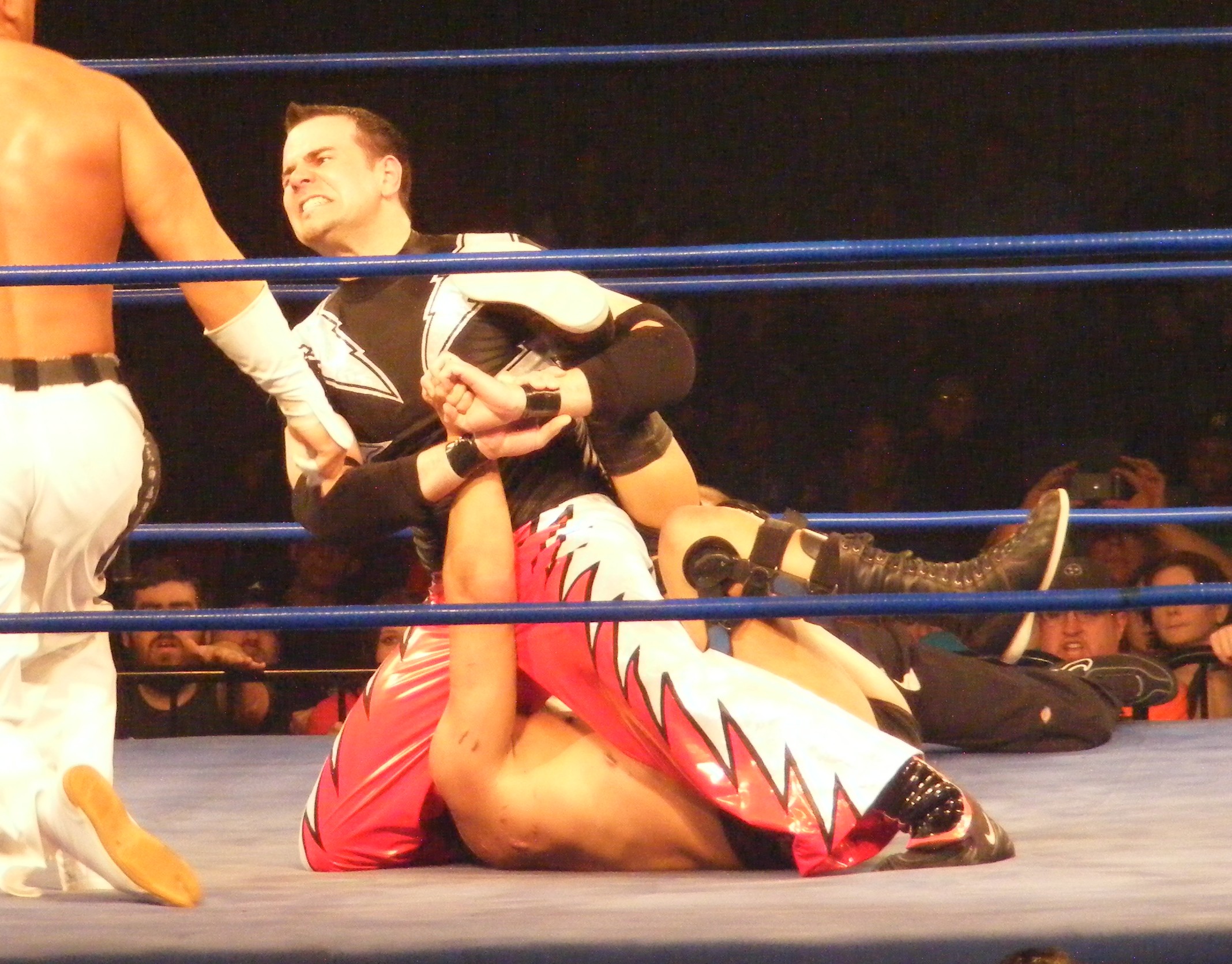
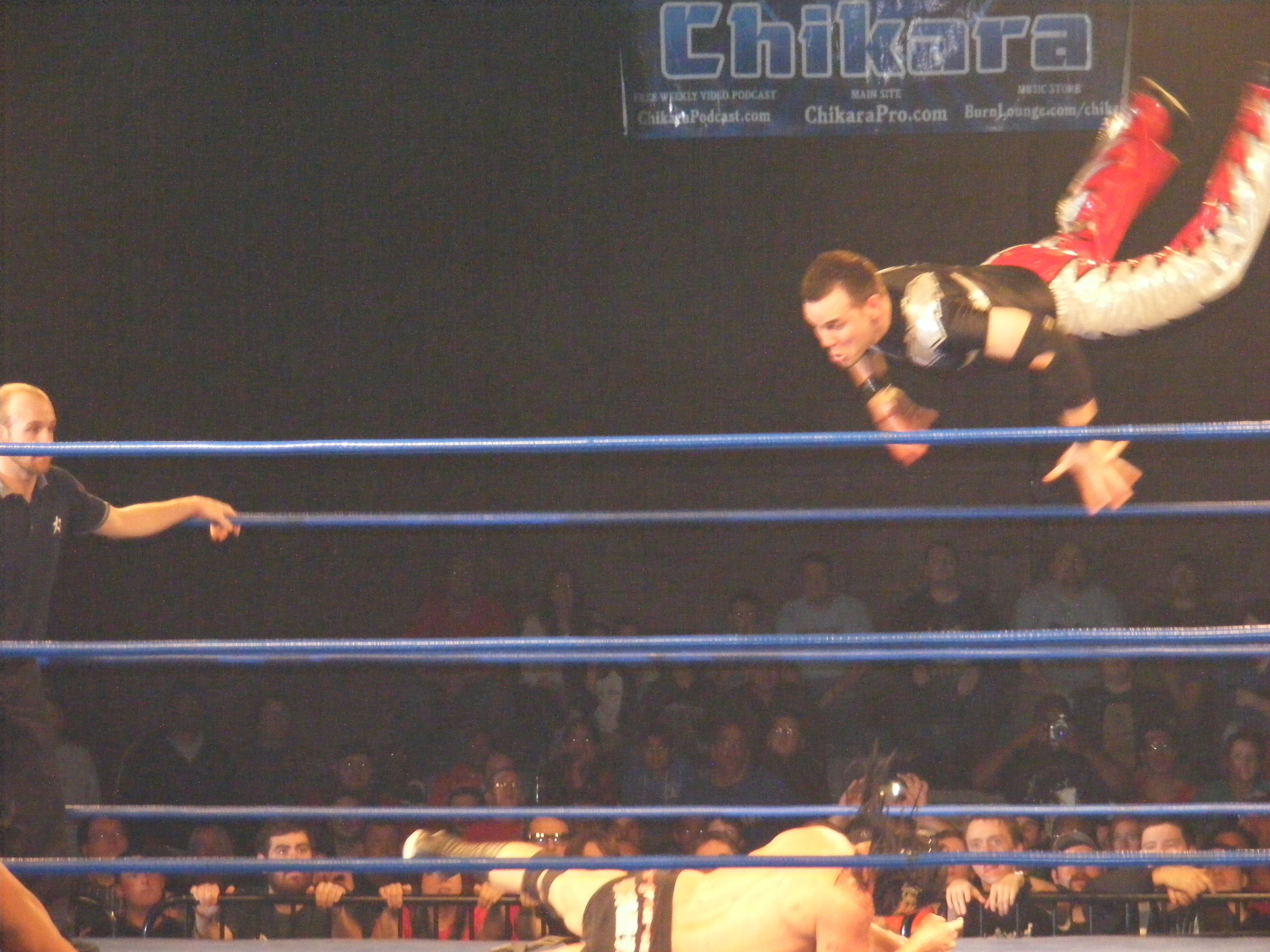
He trained a significant number of wrestlers who went on to achieve success in various promotions, including major ones like WWE and AEW, demonstrating his ability to identify and cultivate talent. His philosophy of teaching emphasized fundamentals, storytelling, and an understanding of the theatrical aspects of wrestling, shaping a generation of performers.
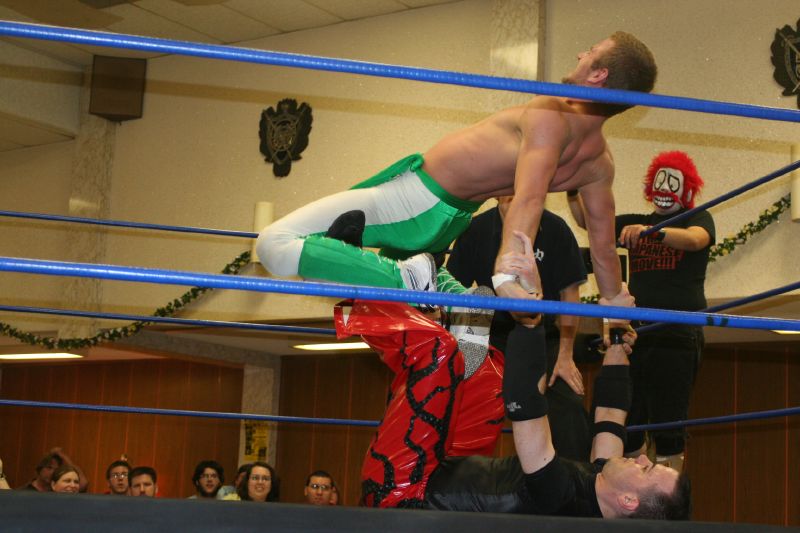
As a promoter, Quackenbush's vision for Chikara created a unique brand that prioritized character development, intricate storylines, and a family-friendly atmosphere, distinguishing it from other independent promotions and contributing to the diversity of the wrestling landscape.
6.2. Criticisms and Controversies
Despite his positive contributions, Mike Quackenbush's career concluded with significant criticisms and controversies, particularly those arising from the #SpeakingOut movement in June 2020. Accusations of inappropriate language and misconduct were publicly leveled against him and his team at Chikara. These allegations led directly to Quackenbush's announcement that Chikara would be shutting down and that he was resigning as head trainer of The Wrestle Factory. The #SpeakingOut movement broadly exposed issues of misconduct and abuse within the professional wrestling industry, and the accusations against Quackenbush contributed to a broader reckoning regarding accountability for those in positions of power. The closure of Chikara and his resignation reflected the serious implications of these allegations on his professional standing and the future of the organizations he led.